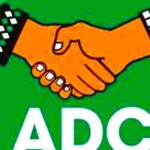ADC State Leaders Break Ranks, Reject Coalition Chiefs Led by Atiku, David Mark

The rejection, announced in a strongly worded communique issued after an emergency meeting of ADC state leaders in Abuja, casts a shadow over the coalition’s credibility and raises questions about internal unity within the ADC.
According to the statement, the chairmen expressed deep dissatisfaction with what they described as an “unauthorized alignment” between certain national figures and the party, allegedly orchestrated without due consultation or consensus from the grassroots leadership.
“The ADC is not for sale. Our commitment is to the people, not recycled alliances driven by personal ambitions,” the communique read in part. “We were neither briefed nor involved in the negotiations that led to this so-called coalition. Therefore, we categorically reject any arrangement involving Atiku Abubakar, David Mark, or any other figures claiming to speak for the ADC.”
This move is seen by political analysts as a bold assertion of autonomy by the state chairmen, who feel sidelined by the party’s national leadership. Many within the party believe the recent coalition undermines the founding principles of the ADC, which touts itself as a platform for fresh ideas and alternative leadership in Nigerian politics.
The coalition in question, unveiled last week, was widely seen as a strategic move to form a united front ahead of the 2027 general elections. Spearheaded by high-profile politicians like Atiku and David Mark, it aimed to rally smaller parties and dissenting voices under one umbrella to challenge the ruling All Progressives Congress (APC).
However, the backlash from the ADC’s state-level leadership threatens to derail these plans.
An ADC chairman from the South West, who preferred to remain anonymous, told reporters: “This is nothing more than a hijack attempt. We will not stand by and watch the same political elite we’ve fought to replace take over our platform. The grassroots must be respected.”
Political observers note that internal divisions within parties are not uncommon in the lead-up to elections. However, this level of open defiance signals deeper tensions within the ADC regarding its strategic direction and ideological identity.
The party’s national headquarters has yet to respond formally to the chairmen’s statement, but insiders suggest a reconciliation meeting may be on the horizon to prevent further cracks from widening.
As the 2027 race begins to take shape, the ADC’s internal dynamics—and how it manages them—will play a crucial role in determining its relevance and cohesion in the increasingly competitive politic
al arena.
TRENDING SONGS
 NPMA Appeals to Nigerian Government for Compensation After Lagos Market Fire
NPMA Appeals to Nigerian Government for Compensation After Lagos Market Fire
 Rest Every Four Hours, FRSC Issues Safety Guide for Fasting Motorists
Rest Every Four Hours, FRSC Issues Safety Guide for Fasting Motorists
 NNPC Boss Ojulari Bags UK Energy Institute Fellowship
NNPC Boss Ojulari Bags UK Energy Institute Fellowship
 Shock in Anambra: Bride Disappears Moments Before Wedding
Shock in Anambra: Bride Disappears Moments Before Wedding
 Nigerian Woman Returns ₦330 Million Accidentally Credited to Her Account
Nigerian Woman Returns ₦330 Million Accidentally Credited to Her Account
 APC Don Reach Morocco?’ VeryDarkMan Reacts to Seyi Tinubu Poster
APC Don Reach Morocco?’ VeryDarkMan Reacts to Seyi Tinubu Poster
 Bride Breaks Down in Tears as Wedding Meals Were Kept Secretly While Guests Go Home Hungry
Bride Breaks Down in Tears as Wedding Meals Were Kept Secretly While Guests Go Home Hungry
 Odogwu by Day, Robber by Night: How Marriage Joy Turned Into Tragedy
Odogwu by Day, Robber by Night: How Marriage Joy Turned Into Tragedy
 Nigerian Officials Allegedly Pocket N4–6B Weekly Through Smuggling Cartels at Seme–Badagry Border
Nigerian Officials Allegedly Pocket N4–6B Weekly Through Smuggling Cartels at Seme–Badagry Border
 Ahmad Yerima: Naval Officer to Face No Sanctions After Clash with Wike – Matawalle
Ahmad Yerima: Naval Officer to Face No Sanctions After Clash with Wike – Matawalle
Share this post with your friends on ![]()













